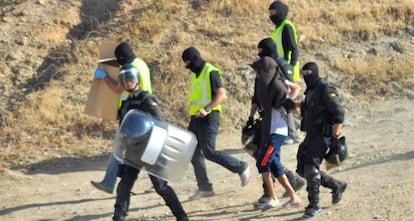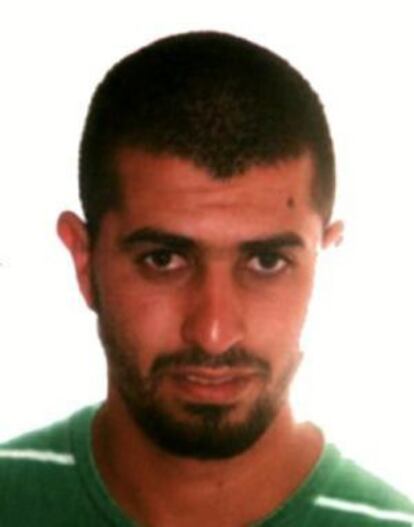The martyr who changed his mind
Sadik Mohamed left Ceuta to fight in Syria, where he was trained by Al Qaeda He decided to return to Spain when he realized he was to be used in a suicide mission

Abdeluahid Sadik Mohamed, a 28-year-old Spanish national who was arrested when he arrived in Spain on January 5 from Syria, where he had fought with an Al Qaeda-linked group, now says that Islamic militants wanted him to carry out a suicide mission by blowing himself up.
Sadik Mohamed, born in the Spanish North African exclave of Ceuta, remains in jail awaiting trial for belonging to a terrorist organization. Police say he received eight months' military training, and that aside from his alleged activities in Syria, he also took part in an attack on the Abu Ghraib prison in Iraq in July.
On July 22, Islamic militants attacked the notorious high security Abu Ghraib jail - where US forces tortured dozens of suspects during the occupation of Iraq - by driving trucks loaded with high explosives and setting off car bombs that ripped holes in the prison's walls. Over the course of the 10-hour battle, dozens of terrorists armed with Kalashnikovs and supported by mortar fire then poured into the grounds and freed more than 500 prisoners being held there.
They are stripped of anything that links them to their past so they will not desert"
The Spanish security services say that Abdeluahid told them that his experiences during the assault on Abu Ghraib, which left 23 Iraqi soldiers and several terrorists dead, changed his mind about continuing to fight for Al Qaeda. Islamic militants carried out a simultaneous attack on the prison in Taj, north of Baghdad, freeing some 400 Islamist prisoners. Sadik Mohamed is believed to have traveled to Iraq from Syria in a military truck, but says that he did not know he was to take part in the attack on Abu Ghraib. He returned to Aleppo, in Syria, unscathed, attributing his good fortune to God's protection.
Married with two children, Sadik Mohamed lives in the deprived El Príncipe district of Ceuta, an area believed by the Spanish authorities to be a recruiting ground for Al Qaeda groups fighting to topple the regime of Bashar al-Assad in Syria. They say that at least nine young men from here and nearby neighborhoods have traveled to Syria to fight. Three of them, named only as Rachid, Piti and Tafo, died when they blew themselves up, killing and injuring dozens of people. The others have not returned. "They go determined not to come back, and calmly tell their friends and families of their intention to sacrifice their lives," says a police analyst.
The authorities say that Sadik Mohamed set off for Syria on April 29, 2013, saying goodbye to his family and promising to return soon. In Morocco he took a flight from Casablanca to Istanbul, and from there to the border town of Hatay, then crossing from Turkey into Syria where he was taken by militants belonging to the Islamic State of Iraq and the Levant (ISIS) to a camp near the city of Al Atarib, some 30 kilometers from Aleppo.
When they saw he didn't want to die, they sent him on dangerous missions"
"A man who sacrifices his life is a hero and his families will be treated with respect. Those who go to fight know that their families will not be left to fend for themselves, that they will receive help from the network. This takes many forms: from sending them money to not charging them in the local butcher's," says a police source.
Three days after leaving Ceuta, Sadik Mohamed met with the men running the Al Atarib camp, who asked him where he came from, and required him to hand over his passport, clothes and cellphone, as well as money for the cost of his Kalashnikov. In return he was given a uniform and boots. "They are stripped of anything that links them to their past: it makes them easier to handle and reduces the likelihood of them deserting," says a Spanish police source. Police say that he was then assigned to an ISIS unit made up of around 20 men. ISIS, run by Abu Bakr al-Baghdadi, has extended its control throughout Syria, and now controls several cities. It was behind the recent uprising that took control of the Iraqi city of Fallujah.
Over the course of the next 40 days, say police, Sadik Mohamed was put through intensive military training and religious indoctrination, and was kept under observation. His group allegedly included volunteers from France, Portugal and Germany, ISIS's policy being to avoid including more than one member from any European country. "They don't really trust them. They even insert veteran Al Qaeda fighters posing as volunteers to keep an eye on them. As the training progresses, European volunteers are graded and classified according to their trustworthiness and fanaticism," says a police source. "Volunteers are not really given much training, and it's very basic: how to assemble and use a Kalashnikov, read a map and handle a radio. These guys are basically cannon fodder being sent in to fight against conventional forces," says a senior member of the security forces.

Abdeluahid Sadik Mohamed was initially assigned guard duties at the camp near Al Atarib. After 40 days' training, he was then put into the field, fighting against Syrian army forces near Aleppo.
Spanish police say that Sadik Mohamed took part in several battles during his time in Syria, and would have seen members of his unit used as suicide bombers. "Al Qaeda do not hold Spanish or Moroccan volunteers in very high regard. The Iraqis and Syrians running ISIS have been fighting for many years now. They see these volunteers as expendable, and usually send them into the toughest situations, into frontline combat," says an intelligence analyst. There are an estimated 7,000 European nationals fighting in Syria.
That said, it appears that Sadik Mohamed was able to leave the camp on a number of occasions, making his way to the town of Al Atarib, where he met up with other Spanish nationals and Moroccans that had been assigned to other units, and who would share news about comrades who had been killed in action or who had taken part in suicide missions. During one of his visits to Al Atarib, Sadik Mohamed reportedly spoke to his wife and sister by telephone, who had already reported him missing to the authorities in Ceuta.
Spanish jihadists
- Spanish police say that they know of 95 Spanish nationals who have gone to Syria to fight with Al Qaeda in the war to topple the Assad regime. The CNI secret service says there are at least 55 Spanish nationals in Syria, 11 of whom have already died.
- Of the Spanish mujahideen that have traveled to Syria, the CNI say 13 are Spanish nationals, mostly from Ceuta. The remainder were living legally in mainland Spain. At least 11 jihadists have taken part in suicide missions against the Syrian army.
- Rachid Wahbi, a Spanish national from Ceuta, drove a truck packed with explosives into an army barracks in Syria, killing 130 soldiers. Another two men, Mustafa Mohamed Layachi, known as Piti, and Mustafa Mohamed, also died in suicide attacks.
Spanish police say that Sadik Mohamed was eventually approached by ISIS leaders and "invited" to undertake a suicide mission, but that he told them that he was not yet ready to do so. Spanish security forces say that Sadik Mohamed was not sufficiently well trained or educated to be of much use to ISIS except as cannon fodder. "He was just one of many, a foot soldier, and to be used as his masters saw fit," says a senior police officer.
Having refused a suicide mission, Sadik Mohamed was allegedly sent to Iraq to take part in the attack on Abu Ghraib, where, say Spanish authorities, he would have been expected to die. "As soon as they realized that he didn't want to die, they began assigning him increasingly dangerous missions," a source says.
Sadik Mohamed has reportedly told Spanish police that after coming under repeated pressure to take part in a suicide mission, he finally realized that he wanted to leave the camp and return to Spain. He apparently heard other volunteers talk of men who had been killed, unaware that they were driving a car bomb, which was set off by remote control or a timer.
He is trying to paint himself as a victim who escaped in fear of his life"
Once in an ISIS camp, escaping is no easy matter. The biggest problem that Sadik Mohamed faced in getting out of Syria was recovering his passport, which he had handed over to ISIS leaders. Arriving in Turkey without papers could land him in serious trouble, although his sister and wife had told him to go straight to the Spanish Embassy. Sadik Mohamed apparently told Spanish police that he knew where ISIS kept the passports of volunteers and was able to recover his. At the beginning of January, after a number of failed attempts, with the help of an unnamed friend he was able to make it from Al Atarib to the Turkish border, managing to hide among the hundreds of people making the crossing on foot, and then heading to Antioch, where he took a flight to Istanbul. According to Sadik Mohamed, his jihad was over.
From there, he then flew to Málaga, where police detained him at the airport passport control. "He had gotten rid of anything that could incriminate him; his phone didn't even have a SIM card," says a police source. "This is the first time, as far as we know, that a Spanish national has returned home from Syria or Iraq after receiving military training and religious indoctrination," reads the court order requiring Sadik Mohamed to be held in prison ahead of his trial for belonging to a terrorist organization. "It is a miracle that he made it out of there alive," says one police officer.
Spanish police say that they are skeptical about what Sadik Mohamed has told them. They say that he is proud of taking part in the attack on Abu Ghraib, but has provided no information about any other activities he might have been involved in. "He is trying to paint himself as a victim, somebody who escaped in fear of his life, but we are also aware of the possibility that Al Qaeda has sent him here to carry out attacks in Spain or Europe." Police say that they believe he was involved in fighting in Syria. "He is potentially very dangerous, like anybody who has been through that kind of experience," says one of the officers leading the investigation. Ayman al-Zawahiri, the Egyptian who took over Al Qaeda's leadership following the killing of Osama bin Laden by US forces in 2011, has apparently issued an order calling for all jihadists to carry out attacks in their own countries. "We are seeing an increasing number of calls for Islamic militants to wage jihad at home," says a court report following Sadik Mohamed's interrogation.
But we know that Al Qaeda may have sent him to carry out attacks in Spain"
Last summer, Spanish police arrested a man named Karim, saying that he was responsible for helping to recruit young men in Ceuta, who then went on to fight in Syria. But the recruitment network is still functioning, say police, and continues to send young men to fight. "There is clear continuity in these networks. We face an enemy that is still very active and that is evolving," says one police source.
Young men like Sadik Mohamed are returning continually to France and to Morocco from Syria, and several have been arrested. The British authorities last week issued a warning that British nationals entering the UK suspected of having fought in Syria will be arrested on suspicion of involvement in terrorism. "It's a long list. We do not know how many have gone to Syria, or who has made it there; we don't know how many have died, and we don't know how many have made it back alive. This is the reality, and this lack of hard information is dangerous. For some who come back, the only way for them to reconcile themselves with God is to carry out attacks here," say police sources.
Laarbi Mateis, the leader of the Jamaat Tablight group, which controls most of Ceuta's mosques, says that young men wishing to wage jihad "must have the permission of their fathers and their wives, and in these cases this has not happened. Three of the widows have told me that they knew nothing about their husbands' plans. A lot of young men have changed their minds about going, fortunately, after we have advised them against it. I tell them that jihad is obligatory for Syrians, but not for Moroccans." At least two other young men from Ceuta, one of them still a minor, are in Syria with Al Qaeda. There is no information about their whereabouts, or even whether they are alive.
Tu suscripción se está usando en otro dispositivo
¿Quieres añadir otro usuario a tu suscripción?
Si continúas leyendo en este dispositivo, no se podrá leer en el otro.
FlechaTu suscripción se está usando en otro dispositivo y solo puedes acceder a EL PAÍS desde un dispositivo a la vez.
Si quieres compartir tu cuenta, cambia tu suscripción a la modalidad Premium, así podrás añadir otro usuario. Cada uno accederá con su propia cuenta de email, lo que os permitirá personalizar vuestra experiencia en EL PAÍS.
En el caso de no saber quién está usando tu cuenta, te recomendamos cambiar tu contraseña aquí.
Si decides continuar compartiendo tu cuenta, este mensaje se mostrará en tu dispositivo y en el de la otra persona que está usando tu cuenta de forma indefinida, afectando a tu experiencia de lectura. Puedes consultar aquí los términos y condiciones de la suscripción digital.









































